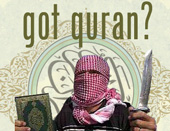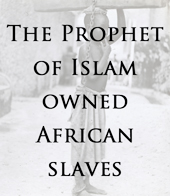What is the Quran?
The Quran (Koran) is the Holy Book of Islam and the religion's most sacred text. The word itself means "recitation." It is a series of "revelations" that Muhammad claimed to have received from Allah at various - often highly convenient - times in his life and then
narrated to scribes.
The most important of the three textual sources of Islam is the Quran. The next
most is the Hadith, a collection of narrations regarding the words and deeds of Muhammad and the early Muslims (some more reliable than others). The third is the Sira, the biography of Muhammad compiled by later historians.
The Quran is divided into 114 Suras (chapters) that contain ayat (verses). Despite the internal claim that it is "perfectly arranged", the Suras are not in chronological or thematic sequence, but sorted simply by general size, with the larger appearing first. As such, there is no logical continuity or transition between chapters - and precious little within.
The Quran was compiled in the years and decades following Muhammad's death from snatches of writings on papyrus leaves, wood carvings, animal bones and, especially, the memory of his companions, who were beginning to die off in the aggressive military campaigns that characterized Islam's expansion.
There is generous redundancy within the text, as well as contradictions - which are said to be resolved through "abrogation," whereby later verses have authority over earlier ones when there is an apparent dispute between them. (It isn't made clear how Muslims are supposed to know which verses are "later" from the text alone, since the Quran is not in chronological order).
Although the words in the Quran are believed by Muslims to be those of Allah, and not Muhammad, there are several places in the narration where this simply doesn't make sense. In some cases, Muslim scribes mended the problem by inserting the word "say" in front of certain text to make it appear as if Allah is telling Muhammad to speak in the first person. In other cases, their clean-up work was not quite as thorough (such as the famous 27:91, in which the word "say" is not in the original Arabic).
The words of the Quran are said to be the literal, eternal words of Allah himself, relevant to all people at all times (although
it includes directives personal to Muhammad, such as 33:53). It is not a book of history, although there is some badly garbled fragments of stories from the Bible scattered throughout. The verses that issue rules and edicts are generally open-ended. Very few are bound by historical context within the text, including calls to violence against unbelievers.
The Quran is almost incomprehensible in and of itself due to the piecemeal way in which it was compiled. Directives, topics, diatribes, incomplete accounts of Old Testament stories and mythological characters appear randomly, with very little literary consistency. Themes are disjointed and shifting, something that would not be expected of a perfect book of instruction.
External sources, such as the Hadith (narrations) are essential for understanding both the context of critical Quranic passages as well as their meaning. Even so, interpretations are often arbitrary and, since there is no longer a central authority in Islam, various Muslim factions often claim
sharply different interpretations.
Older versions of the Quran would be helpful in the study of certain words (since vowels are often left out of transcriptions) but, unfortunately, these ancient texts are either destroyed or hidden from public view by authorities, since they differ somewhat from modern versions - and thus throw into question the Quran's internal claim to be the immutable word of God (although the Hadith plainly indicates that multiple versions existed following Muhammad's death).
The suras of the Quran can be grouped into two distinct periods in Muhammad's life,
when he first lived at Mecca, then at Medina. In the earlier "Meccan" period, Muhammad had little to say about violence or "fighting in Allah's way." Not only did he not have the power to force Islam on others at the time, but he was borrowing heavily from Judeo-Christian religious tradition.
That
changes in the "Medinan" suras, in which the commands to violent Jihad and intolerance increase (corresponding to Muhammad's military strength). The bloody 9th Sura (the Verse of the Sword) is one of the very last to be handed down by the prophet of Islam, and it came at a time when the Muslims had already achieved power over their neighbors, forcing into exile those who would not convert.
Most of the Quran is about unbelievers and much of this is devoted to their earthly or divine punishment. People of other religions are said to be "cursed by Allah." The more tolerant verses (though popular with contemporary apologists) are far less numerous than the later, more violent ones. According to the Quran itself, the later verses abrogate those that precede them (Allah doesn't change his word, 6:115, but he does "substitute" it when he comes up with something better, 2:106 16:101).
It is important to note that the Quran does not contain a single original moral value. However, it is the only major religion to do away with the rule of general benevolence found in all others - including Christianity's "Golden Rule." Instead of advocating universal love and charity, the Quran distinguishes between believers and unbelievers, drawing a sharp distinction in the value of each group and laying the foundation for discrimination and dehumanization (see Is the Quran Hate Propaganda?).
Those who abandon themselves to what the Quran literally says generally become a danger to those around them who are not like-minded. Other Muslims often maintain a discreet loyalty to a predetermined moral framework, around which they mold, filter or ignore inconvenient passages of the Quran - while placing disproportionate emphasis on limited fragments of earlier verses that appear to project a more peaceful message.
The Quran repeatedly stresses Muhammad's personal claim to being a prophet. Those who accept it are morally superior to those who don't. Muslims will receive the highest reward in paradise while the non-believers will suffer egregious torment in hell - as well as a "painful punishment" in this life.
The proclamation that Muhammad is God's prophet happens to be the only original idea in the Quran. It is supported through circular reasoning: Muhammad is Allah's prophet because Allah says so - and we know that Allah says so because that is what Muhammad says. (It isn't hard to see why the early Muslims had to kill a lot of people to get their point across).
Grammatical, theological and scientific errors abound within the Quran, but they are often "explained away" through elaborate and complicated theories that may seem absurd to more objective students - even if such sophistry reinforces the faith of those who believe that the book is perfect in every way regardless of what it contains (to say otherwise is to risk a death sentence). Also, for a book that claims to be "clearly written" it is suspicious that most copies are accompanied by voluminous commentary that often exceeds the actual body of verses.
The exaggerative praise that accompanies the Quran (a book that literally tells Muslim men that they may keep women as sex slaves) makes Christian fundamentalist claims about the Bible "containing God's word" seem rather tame by comparison. Syllables of the Quran continue to be committed to memory with a level of fanaticism that has not diminished over the generations.
Allah apparently spoke in the obscure Quraish dialect
of Arabic. Muslim apologists often pretend that passages of the Quran which clash with modern sensibilities have a different meaning in the original language (even if this alternate meaning seems to have eluded fourteen centuries worth of Arabic-Islamic scholars).
More recent translations are usually tainted by
the interpreter's preferences, particularly in catering to contemporary Western tastes. A quick test for determining whether a version of the Quran is honest or "politically correct" is to turn to verse 4:34 and check whether the word "beat" or "scourge" is used in the instruction to discipline belligerent wives. If it is there, then the copy is probably closer to the Arabic than more recent "whitewashed" versions.
If you are serious about acquiring a Quran, then confirm also that verses 4:24, 23:6, 33:50 and 70:30 stay faithful to the Arabic in using the word 'captive,' 'slave,' or 'those whom thy right hand possesses' in reference to the women authorized by Allah for a Muslim man's sexual use. Contemporary translators are notorious for ignoring the original Arabic and pretending that Muhammad is speaking only of wives, when, in fact, it is evident from the text that he distinguishes wives from non-wives (sex slaves).
The Quran distributed by CAIR, Muhammad Asad's "The Message of the Quran," should be avoided by serious inquirers. It is a 20th century Westernized translation that manipulates the naive by changing the wording of unflattering verse and offering mitigating commentary to convince readers that they are not seeing what they are really seeing.
We recommend the Noble Quran, a recent translation by Islamic scholars, but one that is generally faithful to the Arabic. This is easier to find than others we have recommeded in the past, including the Pickthall, Shakir and Yusuf Ali Muslim translations.
There is also a non-Muslim version of the Quran from CSPI (and an abridged text) that are highly readable - but less objective (and slightly less accurate). This might be a good place to start for beginners, but we suggest balancing it out with occasional references to others, such as the Noble Quran.
|





